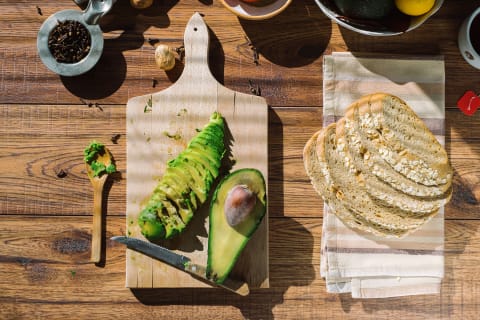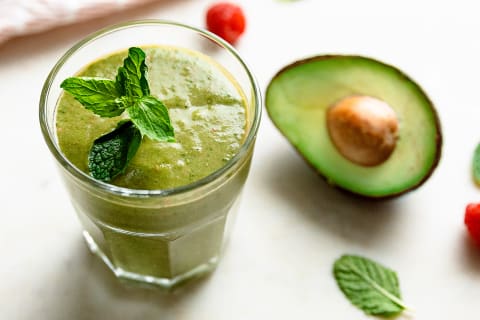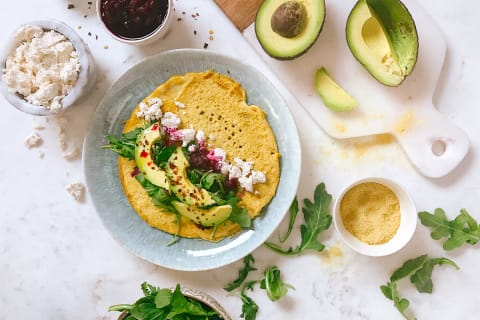
Licensed Nutritionist
Licensed Nutritionist
Sarah Garone, NDTR is a licensed nutritionist and freelance health and wellness writer in Mesa, AZ whose work has appeared in numerous publications.

Image by Sarah Reid / Stocksy
January 19, 2024
It’s breakfast time! What are you choosing—something sweet or savory?
Many (if not most) common breakfasts in the U.S. lean in the sweet direction: Cereals, pastries, oatmeals, and the like tend to star in most morning routines. But since most of us already get plenty of sugar from the rest of our daily diets, it might be time for a change during our morning meals.
Here are 15 savory breakfast ideas, and a primer on why savory breakfasts tend to be superior for blood sugar, satiety, and more.
The need-to-knows
- Any food can be breakfast food: Who says oatmeal and cereal are our only options? Savory picks like sandwiches and rice dishes taste as good in the morning as they do at night.
- Savory breakfasts set you up for a great morning: Savory breakfasts tend to be higher in protein and lower in added sugar, so they’ll kickstart muscle growth and energy expenditure without spiking your blood sugar.
- Building your savory breakfast: Aim for a savory breakfast that packs plenty of protein, fiber, and healthy fat—pick up some new recipe ideas below.
Why eat a savory breakfast?
Before we dive into the savory vs. sweet debate, let’s lay down one key principle: for your health, eating breakfast is important, full stop. Research shows that skipping the first meal of the day is associated with weight gain1 (not loss!) and increased risk of type 2 diabetes2. Your body is most sensitive to insulin early in the day, so you’re best able to metabolize the food you eat at this time.
And if you prefer to eat sweet breakfast foods, there’s nothing inherently wrong with that. It’s possible to build a nutritious breakfast that packs plenty of protein, fiber, and healthy fat and is on the sweeter side. However, there are also reasons to believe that it’s easier to get your day off to a nutritious start with savory breakfasts. Here are a few:
1.
Savory foods tend to be higher in protein.
“Savory breakfasts can be higher in protein,” says Erin Palinski-Wade, RD, CDCES, author of 2 Day Diabetes Diet and creator of The Blood Sugar Fix. Protein is a satiating (filling) micronutrient that is essential for muscle growth, blood sugar balance, and more—and you want to get plenty of it in your morning meal.
However, she points out that this isn’t always the case—it depends on the foods you choose. When building a savory breakfast, opt for high-protein foods. They’ll help you start early to reach your protein target for the day (upwards of 100 grams for most people).
2.
Eating protein early promotes muscle synthesis.
When you eat protein after a night’s fast, it switches your body from a catabolic state (where it breaks down protein for its amino acids) to an anabolic one (where it builds muscle).
Meanwhile, research3 shows that spreading your protein intake throughout the day, starting at breakfast, may be a better strategy for building muscle than eating it all at once. By this logic, working around 20-30 grams of protein into your breakfast is a solid goal.
3.
Savory foods may be higher in fiber.
Fiber feeds your gut microbiome and is essential for satiety4 and blood sugar control5. And adding fiber-rich ingredients to a savory breakfast is often easier than adding them to a sweet one. It’s a little awkward to add veggies to cereal, for example, but a no-brainer to put them in an egg scramble.
4.
Savory foods might be better for blood sugar balance.
On an episode of the mindbodygreen podcast, biochemist Jessie Inchauspé explained that even sweeter breakfasts that are considered healthier, like muesli, can contain sneaky added sugars: “If you look on the ingredients list and there’s sugar, honey, agave syrup, maple syrup, etc. in the top three ingredients, that’s going to create a big glucose spike.”
Casey Means, MD, physician and Chief Medical Officer and Co-founder of metabolic health company Levels, explained that oatmeal is another sneaky breakfast food that can spike blood sugar in some cases. According to data collected from Levels continuous glucose monitor wearers, oatmeal ranked as one of the 40 worst foods for glucose spikes—though its effect on glucose depended on how processed it was and if it had sweet vs. savory toppings.
For this reason, Means calls savory breakfasts one of her best “life hacks.” “It’s really about leaning into that savory, lower carbohydrate, less sweet [option],” Means said on the mindbodygreen podcast.
Summary
Creating a breakfast that balances slow-digesting carbs, protein, and fat tends to be easier with savory foods. Savory breakfasts can keep you full and energized for longer—with less risk of a glucose spike.
Savory breakfast recipes
Savor your breakfast with these 15 non-sweet breakfast ideas. Each of them will get your day started with plenty of protein and minimal sugar.


Image by Mosuno / Stocksy
1.
Avocado and White Bean Toast
Sure, eggs over easy are great on avo toast, but this recipe offers a surprising protein alternative to the beloved brunch: white beans. A hint of miso paste and a sprinkle of chives round out the zingy flavor profile.
- Protein per serving: 20-21 grams
- Added sugar: 0 grams
2.
Egg-Boosted Oatmeal
Don’t knock it ‘til you’ve tried it! This RD-approved recipe adds an egg to oatmeal with high-protein results.
- Protein per serving: 10-11 grams (add another egg to get it to 17)
- Added sugar: 0 grams
3.
Smoked Salmon Egg Muffins
Smoked salmon adds protein and smoky flavor to cheesy, spinach-packed egg cups.
- Protein per serving: 19-20 grams for two muffins
- Added sugar: 0 grams
4.
Turkey and Cheese Roll-ups
You may know turkey roll-ups as a mainstay of party buffets, but done right, they can also make a healthy, savory breakfast. This recipe has whole-grain tortillas and shredded carrots for extra fiber.
- Protein per serving: 20-21 grams
- Added sugar: 0 grams


5.
Green smoothie
- Protein per serving: Varies by recipe
- Added sugar: Varies by recipe
6.
Chicken Congee
Congee is a warming rice porridge that’s long been a staple in Traditional Chinese Medicine. The savory delight is easy to digest, hydrating, and packed with collagen protein. Whip up a big batch to enjoy all week long.
- Protein per serving: 25-26 grams
- Added sugar: 0 grams


Image by Ksenia Avdulova / Contributor
7.
Keto-Friendly Breakfast Burrito with Bone Broth
The surprise ingredient in this keto-friendly burrito: bone broth! The gut-healthy, collagen-containing broth mixes with cooked eggs for an unforgettably savory breakfast.
- Protein per serving: 22 grams
- Added sugar: 0 grams
8.
Black Bean Breakfast Burrito
Canned black beans, salsa, and spices meld together in these easy high-protein, high-fiber burritos. Meat eaters can also add ground turkey or beef to up the protein. Tip: these keep well in the freezer, too!
- Protein per serving: 15-16 grams
- Added sugar: 0 grams (just make sure the tortillas don’t have any)
9.
Savory Pancakes
Not all pancakes have to be sweet! These savory ones are made with sweet potatoes, cheddar, and some Greek yogurt for protein. As a bonus, they take just 6 minutes to make.
- Protein per serving: 29-30 grams
- Added sugar: ~2 grams (depending on the milk and yogurt used)
10.
Masala Egg Bites
Made in a muffin tin for easy prep, these mini frittatas are a veggie-rich snap to make. Put your very own flavor spin on them by adding your favorite blend of herbs and spices—or try the masala blend featured here.
- Protein per serving: 28-29 grams
- Added sugar: 0 grams
11.
Simple Southwestern Tofu Scramble
Tofu is very high in protein for a plant food—and it makes the best mock eggs you’ll ever taste. When you load it up with veggies and a DIY Southwestern sauce, the spicy results are certain to perk you up in the morning.
- Protein per serving: 15 grams
- Added sugar: 0 grams
12.
Veggie Breakfast Quesadillas
The great thing about quesadillas: you can fill ’em any which way you like—such as with eggs, spices, and lots of veggies. Try this recipe’s unexpected combo of zucchini, spinach, and pickled jalapeño.
- Protein per serving: 20-21 grams
- Added sugar: 0 grams
13.
Shakshuka
Shakshuka is a super savory North African dish of poached eggs in stewed tomatoes. Make it yourself on a chilly morning for a warming, protein-rich breakfast.
- Protein per serving: 16-17 grams
- Added sugar: 0 grams
14.
Healthy Breakfast Pizza
Did someone say pizza for breakfast? We’re in! This lightened-up recipe tops an A.M. pizza with fresh spinach, grape tomatoes, and bacon crumbles (but feel free to sub in another meat or veggie bacon if you like).
- Protein per serving: 21 grams
- Added sugar: 0 grams (but check your pizza dough!)
15.
Breakfast Fried Rice
Leftovers pull double duty when you repurpose extra rice as a breakfast starter. Invite bacon, eggs, and frozen veggies into the mix, then season with low-sodium soy sauce or aminos and cook in sesame oil instead of highly processed seed oils. It’s way better than takeout.
- Protein per serving: 17-18 grams
- Added sugar: 0 grams (as long as your soy sauce doesn’t have any)
Building a savory breakfast
Scratching your head over how to build the perfect breakfast meal that’s got plenty of protein and won’t spike your blood sugar?
Palinski-Wade offers a few simple steps that take the guesswork out of savory breakfast planning. “My formula for building a blood sugar-balanced meal is to focus on combining protein, good fats, and fiber. This combination will promote steady blood sugar levels while also helping you to feel full and satisfied.”
- Start by picking a source of protein (think: eggs, yogurt, beans, or lean meat)
- Add a healthy fat (like avocado, flax seed, olive oil, or a bit of cheese)
- Finish things off with a source of fiber, such as vegetables, fruit, or grains
The mindbodygreen POV
But there’s no reason to limit yourself to the typical breakfast foods for your first meal. Instead, aim to put together a meal that combines protein (ideally 20-30 grams), fiber, and healthy fat. Chances are, you’ll end up with something more savory-leaning than pancakes or a fruit smoothie.
Savory breakfasts tend to be higher in the macronutrients you need to start your day feeling satisfied and energized. They’re a better vehicles for protein, in particular, which is essential for everyone (yes, even those who aren’t looking to gain muscle).
If you prefer sweet breakfasts, great! Bring on the pancakes—just know you may need to get a little creative with how you up their fiber, fat, and protein profile. Protein powders and fiber supplements may come in handy here.
—Emma Loewe, mindbodygreen health and sustainability director
Frequently Asked Questions
Is it better to have a savory breakfast than a sweet one?
Both savory and sweet breakfasts can be healthy, but it’s often easier to ramp up nutrients like protein and fiber in savory options.
What are some simple savory breakfast ideas?
For a simple savory breakfast you can take on the go, stick with hand-held options like bean-topped toast, turkey roll-ups, or green smoothies. They don’t take long to make and travel well.
What are some savory breakfast ideas I can make for a crowd?
Need to feed a small army? Lean on breakfast casseroles, slow-cooker bean burritos, or wide-skillet hashes. These can all make large-batch portions to satisfy your hungry morning crew.
The takeaway
Formulating a nutritious savory breakfast gets easier the longer you do it. Start with familiar favorite high-protein ingredients, add some fiber and healthy fats, and you’ll be well on your way to creating savory meals that won’t spike your blood sugar in the A.M. For even more inspiration, check out our RD-recommended healthy breakfast ideas.








